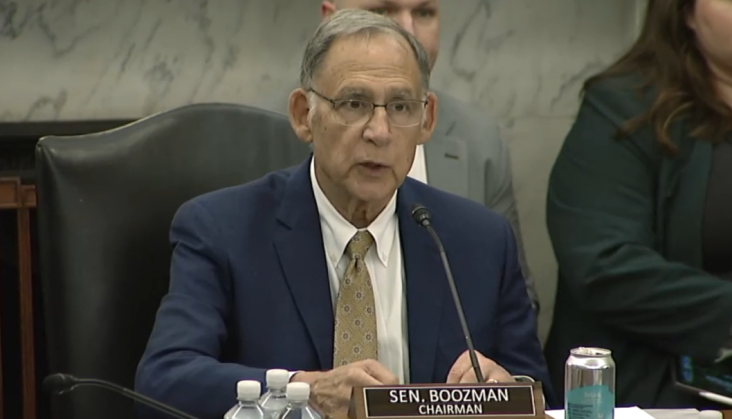Sen. Boozman wants parts of Farm Bill in reconciliation process, cautious on Medicaid cuts
by May 19, 2025 7:06 am 974 views

U.S. Sen. John Boozman, R-Ark., laid out his thoughts on where the Farm Bill debate is headed in an interview last week with Talk Business & Politics D.C. Edition.
Boozman, who chairs the Senate Agriculture Committee, led a hearing this week to focus on the conservation portion of the Farm Bill. Poinsett County farmer Brad Doyle testified before Boozman’s committee and emphasized the role of conservation programs for farmers and ranchers. Boozman said it’s too hard and takes too long for farmers to receive conservation funding once they qualify.
“Right now, one of the problems we’ve got is it’s too complex,” he said. “The paperwork is too hard. It takes too long to get a result as to whether or not you’re going to receive a grant concerning conservation. And then it takes way too long once you’re accepted for you to actually get the money. So we’ve got lots of problems like that. We want to make sure a one-size-fits-all solution isn’t what comes out of Washington.”
When asked about the timing of a Farm Bill vote, Boozman said he hopes certain parts of the ag bill, such as crop insurance, can go through the reconciliation process to speed up funding for farmers.
The reconciliation bill — what President Donald Trump has called “The Big, Beautiful Bill” — is aiming to extend the 2017 income tax cuts while cutting trillions of dollars from federal spending.
“I’d like to get the risk management tools — that’s the real expense of the Farm Bill — I’d like to get that included in reconciliation,” Boozman said. “The importance of that is if farmers, if they just don’t have the ability to hedge their risk, then they’re not going to be able to borrow the money they need to go forward. Bankers are telling us this. We’re seeing all kinds of farms now going out of business, so it’s a big deal.
“So I’d like to get that done in reconciliation, then come back and pass the rest of the Farm Bill as soon as possible into a little bit later in the year.”
If parts of the Farm Bill were included in the reconciliation process, relief would still be months away.
“I can’t tell you exactly when it will be, but the good news is the Senate Majority Leader John Thune wants to go forward regarding the Farm Bill,” Boozman said. “Again, I’d like to see part of it done in reconciliation and that would need to be done before August because the debt ceiling is going to be part of that. So that’s when in August is when they’re telling us it’s the drop dead date.”
While much focus on the reconciliation bill has centered on the House of Representatives, Boozman said senators are talking behind the scenes. He worries that too many concessions could bog down proceedings. With thin GOP margins in the House and the Senate, the effort to cut spending could derail.
“The danger is that this thing (the reconciliation bill) becomes a Christmas tree that’s moving and everything gets hung on it,” Boozman said. “And then by the time it’s over, the math doesn’t add up anywhere close. … Our numbers are different than the House, and that’s still in motion right now.”
In general, the Republican-led reconciliation bill is aiming to preserve about $4 trillion in income tax cuts and $2 trillion in spending cuts over the next 10 years.
A big component of those spending cuts centers around Medicaid reductions of about $625 billion. Arkansas could stand to lose as much as $797 million annually.
Boozman said he’s for tightening up waste and fraud in the Medicaid program as well as adding a work requirement to the program nationally. He is not supportive of the federal government lowering its percentage of contributions to the states and forcing them to make up the difference.
“I’m very much not in favor of cutting benefits regarding Medicaid,” he said. “Many of our states actually do live within balanced budgets. And to dump a huge multimillion, tens of millions, in some cases, hundreds of millions of dollars in unfunded mandates would be really difficult.”
“I don’t have any problems with increasing the work requirements a little bit or getting the work requirements for the nutrition program and Medicaid linked together,” Boozman said. “Those are things that I think there’s a lot of support for both in Congress and in the public.”
